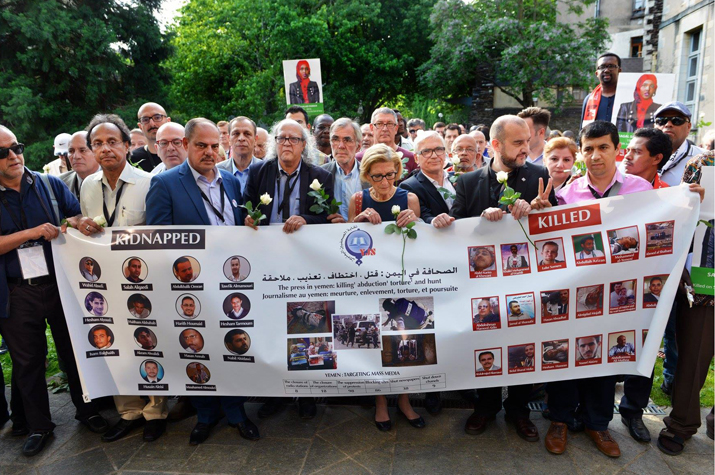Future of journalism in the spotlight at IFJ congress

At the end of Day Two, congress delegates marched in honour of photojournalist Camille Lepage, a native of Angers, who was killed in the Central African Republic in 2014 while on assignment. © Antonio Bozzardi
 MEAA board member and Sydney Morning Herald journalist Marcus Strom was a delegate at the International Federation of Journalists 29th world congress in Angers, France, last week. He filed these daily reports from the congress.
MEAA board member and Sydney Morning Herald journalist Marcus Strom was a delegate at the International Federation of Journalists 29th world congress in Angers, France, last week. He filed these daily reports from the congress.
Angers is in the Pays-de-la-Loire region of France, south-west of Paris. Angers is on the Loire River between Nantes to the west and Tours to the east.
In Angers this week, delegates from around the world will meet to discuss and debate some of the most pressing matters facing journalists and journalism.
Importantly, delegates will also be ensuring IFJ governance and finance transparency is improved. There were many questions raised last congress in Dublin about the manner in which the organisation is run.
The National Media Section of MEAA has asked our delegation to report back on IFJ governance as a matter of priority.
Other matters facing congress include:
• meta-data laws;
• protection for whistleblowers and journalist sources;
• press freedom;
• gender equity in journalism;
• the fight against impunity for murderers of journalists;
• safety for journalists;
• the economics of journalism and the threats to journalistic independence and integrity: are Google and Facebook saving or swallowing journalism?
I am a nominee for the congress presidium of five that will run congress while it is in session. If elected, this will keep me very busy.
The rest of MEAA’s delegation is:
Paul Murphy, MEAA chief executive (Paul attended IFJ Dublin in 2013); Shauna Black, MEAA board member and freelance journalist; Ben Butler, MEAA Victoria state council member, MEAA Safety and Solidarity Fund committee and business journalist at The Australian; Alana Schetzer, MEAA Victoria, Women in Media Victoria and most recently at The Age; Michael Janda, MEAA board member, media section vice-president and ABC business journalist.
Former MEAA federal secretary Chris Warren is attending as an outgoing member of the IFJ congress in an observer status.
Day One (June 7)
Congress started with a morning panel on the 90 year history of the International Federation of Journalists.
Amazingly (should I be surprised?), the opening panel had no gender, ethnic or age diversity!
While this was ‘recognised’ by the Secretary-General, Anthony Bellanger, the outgoing President Jim Boumelha, said that they had tried to invite a woman to the panel, but she wasn’t available.
The session focussed on the history from 1926 to World War Two, then looked at the Cold War years, when the Soviet-backed International Organisation of Journalists was also active.
Speakers were Kaarle Nordenstreng, former IOJ president; Michel Diard, former general-secretary of the French journalist union SNJ-CGT; Vsevolod Bogdanov, President of the Russian Union of Journalists; François Boissarie, former first general-secretary SNJ, France; and Wolfgang Mayer from the German union, DJU.Verdi.
Much of this first session dealt with competition between competing Cold War blocs in the developing world.
Day Two (June 8)
Tuesday was pre-congress: a series of ‘interventions’ from invited speakers from the delegations to share their experiences of organising media workers in their various national contexts.
Symbolic and practical solidarity with our colleagues in countries such as Yemen, Philippines, Sri Lanka, is the ongoing basis of international co-operation. In such countries, journalism is a matter of life and death.
More practical for day-to-day organising in countries such as Australia is co-ordination and information sharing of new forms of organising.
The first period after lunch focused on such matters, with speakers from the UK and Ireland, Brazil, Japan and Switzerland.
Michelle Stanistreet from the National Union of Journalists in the UK and Ireland focused on how a culture of job insecurity breeds a culture of fear and low morale. This, however, has started to turn into anger and NUJ has had some successes in organising this anger and frustration.
An NUJ survey showed that one in five journalists earns less than 20,000 pounds, two-thirds have had no pay rise in the past three years and one in five freelancers has been asked to work for free.
Maria Jose Braga, the vice-chair of FENAJ in Brazil, was disappointed she couldn’t talk in her native Portuguese and read a statement in Spanish.
Her contribution looked at the impact of neo-liberalism on workers in general and journalists in particular. There is little room to move ahead, she said, with much energy focused on resisting losses.
She said that as well as working for pay and conditions, media workers need to engage with social change and develop a journalist ‘identity’.
Central is our engagement with freedom of speech, freedom of the press and human rights. This links our struggle with the interests of the population.
A further problem, she said, is continued concentration of media ownership. Despite the technological changes of the internet and social media, this concentration prevents the free movement of information, which in turn reduces the number of jobs.
We must fight for the democratisation of the media.
Masatoshi Nakamura, President of the Media Forum in Japan, said that the current Japanese government was the most aggressive since 1945. Collective bargaining is not enough to take this fight to the government, it must become more political.
The Swiss delegate said we must look at our weaknesses before moving to look at our strengths. In Europe he said the rise of the far right was a real threat to our ability to fight for solidarity.
A further session was titled “The next 10 years”.
Stuart Laidlaw from Unifor, Canada, said that his colleagues had said to him: “Why do you get to speak on the most depressing session of the day”.
He discussed matters familiar to Australians: job losses, ownership concentration and looming paper closures.
An earlier speaker from Peru, Zuliana Lainez Otero said Google promoted journalism “as if they were the author” … highlighting the increasing division between media production and distribution.
She discussed the proliferation of media platforms allowing for multiple advertising options for employers. Journalists see no additional income.
Otero was concerned about the future credibility of journalism given a heightened culture of “hate speech” (I think she means overly partisan commentary) emerging in the media.
Day Three (June 9)
The first full day of congress elected the five-person presidium, which runs congress.
I was elected to the presidium alongside Salah Sidig, from SUJ Sudan; Patrick Kamenka, from SNJ-CGT, France; Anna Del Freo from FNSI, Italy; and Tim Dawson, from NUJ Britain/Ireland.
Anthony Bellanger delivered a comprehensive Secretary-General’s report that was well received. It outlined the work of the IFJ since the last congress, including a look at the safety work provided by IFJ, the projects in regions, including union training and gender equity work.
There were questions from the Danish union president Lars Wenge about how the money for the safety fund was accounted for and distributed. The Danish union will not resume payments to the safety fund until it is satisfied the process for payments is transparent. Secretary-General Bellanger said he would meet with Lars Wenge in Brussels or Copenhagen to resolve this matter.
Wolfgang Mayer delivered the honorary treasurer’s report, but that was not so well received. In delivering his address, Mr Mayer indeed said “you will not like the numbers”, and he was correct, judging by the tone and content of the ensuing questions and responses.
Mr Mayer said the financial difficulties encountered by IFJ were down to “external choices”, although it was not quite clear what he meant by this.
This prompted a dispute around the funding of the 2013 congress in Dublin that was sent to the finance commission for discussion and hopefully resolution.
After lunch, the appeals commission and resolution commissions met while questions regarding finance continued in the plenum.
After a very deep deficit in 2013, the budget has slowly returned to surplus, however, as the outgoing treasurer said, the finances of the IFJ remain ‘fragile’. It is vital, in this author’s opinion, that congress elects a highly capable treasurer for the next three years.
A change in Belgian accounting procedure after 2013 saw a shift in the basis for financial reporting in the accounts. Ben Butler and Shauna Black from Australia said it was unacceptable that the accounts did not fulfil international accounting standards.
Congress heard a partial report from the appeals commission. Angola, Congo Brazzaville and Kosovo were readmitted to full IFJ membership. The appeals commission will give a final report on day three, with the membership of Pakistan an outstanding matter.
There were incidental reports from a French journalist centre and an insurer, which will help the IFJ include safety insurance as part of the international press card.
At the end of day one, delegates gathered outside the Angers conference centre and we marched with white roses to the Angers library.
The march was in honour of the photojournalist Camille Lepage, a native of Angers, who was killed in the Central African Republic in 2014 while on assignment.
At the library, a plaque was unveiled next to an installation of her photos, including a self-portrait.
Camille’s mother, Maryvonne Leage, gave what was clearly a very powerful and emotional speech. This was followed by words from IFJ outgoing president Jim Boumelha and the mayor of Angers.
Marcus Strom’s Day Four report and final analysis of the IFJ congress is available here.